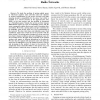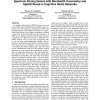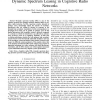68 search results - page 3 / 14 » Game theory for cognitive radio networks: An overview |
CDC
2008
IEEE
14 years 1 months ago
2008
IEEE
— We study the problem of pricing uplink power in wide-band cognitive radio networks under the objective of revenue maximization for the service provider and while ensuring incen...
WCNC
2010
IEEE
2010
IEEE
Hedonic Coalition Formation Games for Secondary Base Station Cooperation in Cognitive Radio Networks
13 years 11 months ago
— In order to maintain a conflict-free environment among licensed primary users (PUs) and unlicensed secondary users (SUs) in cognitive radio networks, providing frequency and g...
MOBIHOC
2010
ACM
13 years 5 months ago
2010
ACM
In cognitive radio networks (CRN), primary users can lease out their unused bandwidth to secondary users in return for a fee. We study price competition in a CRN with multiple pri...
TWC
2010
13 years 2 months ago
2010
Dynamic spectrum leasing (DSL) is one of the schemes proposed for dynamic spectrum sharing (DSS) in cognitive radio networks. In DSL, spectrum owners, denoted as primary users, dyn...
TSP
2010
13 years 2 months ago
2010
Abstract--The concept of cognitive radio (CR) has recently received great attention from the research community as a promising paradigm to achieve efficient use of the frequency re...




